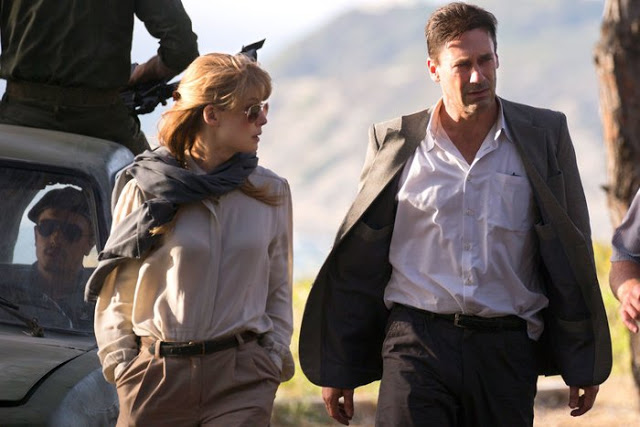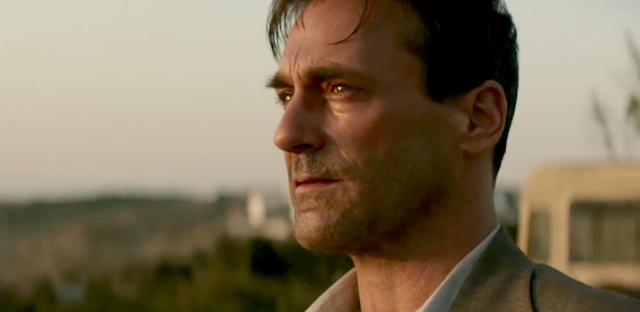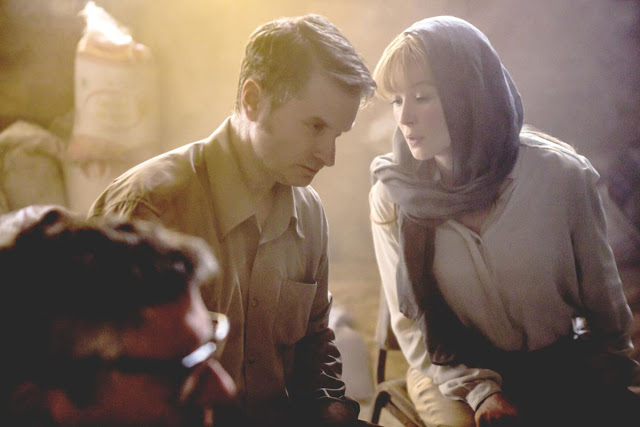For a movie purportedly concerned with the strife and factionalism that have ravaged its war-torn central city, it’s telling that Beirut opens with a scene of hobnobbing luxury. The year is 1972, and we’re at a lavish dinner party where the host, Mason Skiles (Jon Hamm), is schmoozing effortlessly with his well-to-do guests. He’s regaling them with some Lebanese history, and while his tale—a loaded parable about uninvited immigrants chafing an entrenched citizenry—may be troubling, his tone is buttery velvet, his face all smiles. It’s a productive dissonance that proves to be an apt metaphor for Beirut itself, a film that strives to be profound and discomfiting and settles instead for being broadly, almost inadvertently enjoyable. As brokered compromises go, the Middle East has seen worse.
The most obvious source of this accidental pleasure is Hamm, who plays Mason with a twinkly intelligence that nicely complements his patented superiority and world-weariness. As sketched in Tony Gilroy’s uneven script—which punctuates that initial soiree with a fatal spray of gunfire before fast-forwarding ten years—the Mason of the present is a classic redemption case, a morose drunkard who scarcely resembles the cheery mingler from a decade earlier. Hamm articulates Mason’s superficial glumness well enough—and it doesn’t get much glummer than mediating labor disputes in a rainy Boston suburb—but he’s better at revealing the smooth operator underneath, the intuitive poker player who once served as one of his country’s top diplomats. Mason, who may be the highest-functioning alcoholic in recent cinematic memory, is too up on his game to be down in the dumps.
Gilroy has directed two of my favorite movies (Michael Clayton and Duplicity), but he’s probably best known in Hollywood as an inveterate script doctor who penned the first three Jason Bourne films. (He subsequently made the unfairly maligned Bourne Legacy before leaping off a sinking ship.) And Beirut is essentially a stripped-down espionage thriller that replaces the genre’s frenetic punching and kicking with clenched strategy sessions and tense negotiations. Conceptually, that has some appeal, and while the movie’s surfeit of industry jargon and information can be overwhelming, it is not unpleasant. There’s a gritty verisimilitude to Gilroy’s steeped-in-spooks dialogue, the way characters chatter constantly about Mossad and assets and black ops. Attempting to parse their double-speak feels a bit like wandering around a smartly manicured hedge maze; getting lost is part of the fun.
Unfortunately, if Beirut is difficult to follow intellectually, it’s even harder to track visually, thanks to a gloomy-grey palette and some oppressively dim lighting. Many of the nighttime scenes seem to take place in total blackness, while even the film’s interiors appear to be scrubbed of color, as though someone turned the TV’s brightness setting down to zero. Perhaps this literal darkness is meant to evoke the metaphorical despair that clouds the cloaked proceedings and the shadowy characters, but it’s hard to invest in all the bombs and betrayals when you’re squinting to see who’s standing where.
Our director is Brad Anderson, a television gun-for-hire who’s made a handful of decent big-screen thrillers, including the delightful Transsiberian and the enjoyably silly Stonehearst Asylum. His approach here is suitably workmanlike; he recognizes that he’s assembled a quality cast, and he wisely stays out of their way and lets them yammer. Only in Beirut’s final stretches—when its duplicitous, chessboard-moving geopolitics gives way to straightforward, race-the-clock action—does Anderson seem ill-equipped to handle the material, resulting in some desultory scenes of wanly choreographed violence.
That cast, though, is awfully good; in addition to Hamm, Rosamund Pike stars as a sharp CIA operative, while three #PeakTV fixtures—Dean Norris, Shea Whigham, and Larry Pine—portray shifty State Department types with dubious agendas. These are all fine actors who are naturals at playing suspicious sorts, and while it might have been nice for the film to create some interesting Lebanese characters (its one attempt in this regard is decidedly half-hearted), it’s nevertheless engrossing watching Mason attempt to pick his way through this wolves’ den, trying to avoid getting eaten and maybe even saving a few lives in the process.
The life most principally at risk, besides his own, is that of Cal (Mark Pellegrino), a former colleague linked to Mason’s tragic past who’s been kidnapped by anonymous militants. Will long-simmering resentments impede Mason’s perilous hostage-negotiation efforts? As with most of Beirut, that’s a theoretically interesting question that struggles to develop real momentum, but this failure doesn’t dilute the thrill of a sly scene where Mason and Cal, the latter shackled to a wall, trade coded statements about trustworthiness and survival.
Such subterfuge is a matter of life and death, but its slickness speaks to Beirut’s central irony: Here is a deeply serious movie—about Israel and Palestine, about American interventionism, about the sacred lost art of diplomacy—that is very difficult to take seriously. Despite the bombed-out buildings that dot its desolate landscape, little about the film feels meaningful or hard-hitting. To which a seasoned bullshit-cutter like Mason might respond, “So what?” Beirut’s predictable spy games are by no means memorable, but they’re reasonably diverting—at one point, Mason gets a special belt!—with a professional sheen that helps camouflage their emptiness.
“It wasn’t some grand romance,” Pike’s character says when pressed about a clandestine affair with a fellow agent. “It just gets lonely.” That’s a rare and stark moment of emotional honesty, and it corresponds with Beirut’s own muted achievements. Ambitions aside, a movie like this can’t change the world, but it can temporarily help you escape from it.
Jeremy Beck is the editor-in-chief of MovieManifesto. He watches more movies and television than he probably should.



